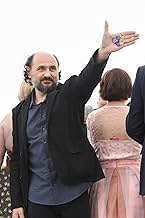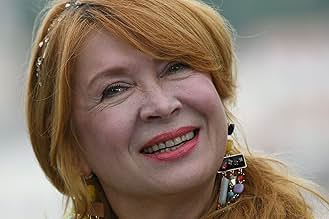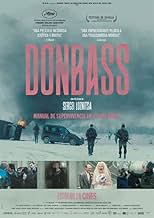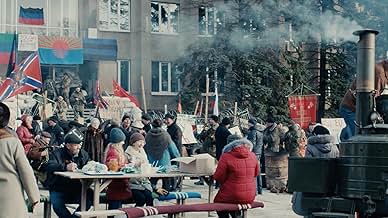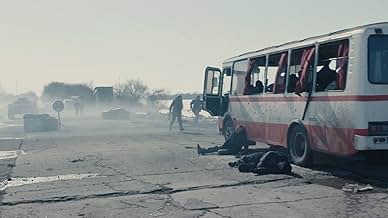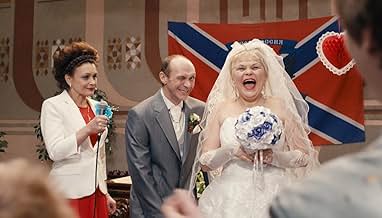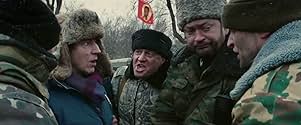Donbass
- 2018
- 2 h 2 min
AVALIAÇÃO DA IMDb
6,6/10
5,1 mil
SUA AVALIAÇÃO
No leste da Ucrânia, a sociedade começa a se degradar à medida que os efeitos da propaganda e da manipulação começam a surgir.No leste da Ucrânia, a sociedade começa a se degradar à medida que os efeitos da propaganda e da manipulação começam a surgir.No leste da Ucrânia, a sociedade começa a se degradar à medida que os efeitos da propaganda e da manipulação começam a surgir.
- Prêmios
- 9 vitórias e 14 indicações no total
Olesya Zhurakivska
- Girl with bucket
- (as Olesya Zhurakovskaya)
Enredo
Você sabia?
- CuriosidadesOfficial submission of Ukraine for the 'Best Foreign Language Film' category of the 91st Academy Awards in 2019.
- ConexõesReferenced in Radio Dolin: Sergei Loznitsa (2022)
- Trilhas sonorasThe National Anthem of Ukraine
Lyrics by Pavlo Chubynsky
Music by Mikhailo Verbytsky
Performed by The Veryovka National Academic Ukrainian Folk Choir
Avaliação em destaque
Saw this at the Rotterdam film festival 2019. If this movie wanted to showcase chaos and lawlessness in a warzone annex newly born country, they did it very well. On the other hand, we did not get a chance to feel involved with the local people as we hardly know enough about the circumstances and the differences that kept those people apart. The division in loosely coupled chapters did not help either. There is nothing to bind the chapters together, merely leading to several (and now for something completely different) sketches. All of them interesting in their own way, but we are left to our own devices to arrive at a common morale or a message.
We often heard the word "fascist" used, more as a general word to denote something negative, rather than having to do with the real meaning of fascism (just like the word "communist" in the Mccarthyism era in the USA was used for everything beyond the norm). I got the impression that the soldiers at the road blocks also did not know exactly what was going on and in which battle(s) they were involved. Similarly, the man tied to a lantern pole and exposed to the whims of the public, was also often accused of being one of the fascists over there, leaving us to assume that the people "over there" also used some label for the opposite side. As a side note, the German journalist held up at one of the road blocks was indirectly labelled as a fascist, because he may not be a fascist himself, but his father and grandfather surely had been one (I quote).
The movie consists of a series of separate chapters, on very different locations and in even more different settings, among which a road block and a wedding. Only the first and last chapter were connected by showing the same persons and location, having their make up ready in preparation of a "real live" scene. The ending of the second instance was a bit unexpected, however, but fitted very well in the "fake news" theme of the movie. We hear, for instance, a witness who saw a mass killing from her balcony, give her "testimony" two times in front of a camera crew, seemingly spontaneous including tears and being unable to speak further. We know better while watching how the scene was created twice (a second take was needed for a wider shot, but the "spontaneous" elements were identical).
All in all, the movie kept me at a distance and did not involve me. Even worse, I saw the well-known problems of former Sovjet-countries also manifest here, like corruption, unability to depend on the law, and self-serving civil servants. (Is this a pun? It sounds like one but not intended.)
The emphasis on fake news as the central theme of this movie, escaped me. But I see it in any synopsis or review, so I may have missed something important. Or was it intended to suggest a contemporary theme, something we should be concerned about?? I've read somewhere that the stories we see were all based on previous "fake news" clips on social media. In hindsight, this may explain the assortment of loosely coupled "sketches" without a common central theme.
We often heard the word "fascist" used, more as a general word to denote something negative, rather than having to do with the real meaning of fascism (just like the word "communist" in the Mccarthyism era in the USA was used for everything beyond the norm). I got the impression that the soldiers at the road blocks also did not know exactly what was going on and in which battle(s) they were involved. Similarly, the man tied to a lantern pole and exposed to the whims of the public, was also often accused of being one of the fascists over there, leaving us to assume that the people "over there" also used some label for the opposite side. As a side note, the German journalist held up at one of the road blocks was indirectly labelled as a fascist, because he may not be a fascist himself, but his father and grandfather surely had been one (I quote).
The movie consists of a series of separate chapters, on very different locations and in even more different settings, among which a road block and a wedding. Only the first and last chapter were connected by showing the same persons and location, having their make up ready in preparation of a "real live" scene. The ending of the second instance was a bit unexpected, however, but fitted very well in the "fake news" theme of the movie. We hear, for instance, a witness who saw a mass killing from her balcony, give her "testimony" two times in front of a camera crew, seemingly spontaneous including tears and being unable to speak further. We know better while watching how the scene was created twice (a second take was needed for a wider shot, but the "spontaneous" elements were identical).
All in all, the movie kept me at a distance and did not involve me. Even worse, I saw the well-known problems of former Sovjet-countries also manifest here, like corruption, unability to depend on the law, and self-serving civil servants. (Is this a pun? It sounds like one but not intended.)
The emphasis on fake news as the central theme of this movie, escaped me. But I see it in any synopsis or review, so I may have missed something important. Or was it intended to suggest a contemporary theme, something we should be concerned about?? I've read somewhere that the stories we see were all based on previous "fake news" clips on social media. In hindsight, this may explain the assortment of loosely coupled "sketches" without a common central theme.
- JvH48
- 24 de fev. de 2019
- Link permanente
Principais escolhas
Faça login para avaliar e ver a lista de recomendações personalizadas
- How long is Donbass?Fornecido pela Alexa
Detalhes
- Data de lançamento
- Países de origem
- Central de atendimento oficial
- Idiomas
- Também conhecido como
- Донбас
- Locações de filme
- Empresas de produção
- Consulte mais créditos da empresa na IMDbPro
Bilheteria
- Faturamento bruto mundial
- US$ 141.067
- Tempo de duração2 horas 2 minutos
- Cor
- Proporção
- 2.35 : 1
Contribua para esta página
Sugerir uma alteração ou adicionar conteúdo ausente


![Assistir a Trailer [OV]](https://m.media-amazon.com/images/M/MV5BZDBjMTdhZDYtOWI4NS00NmYwLWExYjgtY2VmYzQxYzlkNDhmXkEyXkFqcGdeQXRyYW5zY29kZS13b3JrZmxvdw@@._V1_QL75_UX500_CR0)
